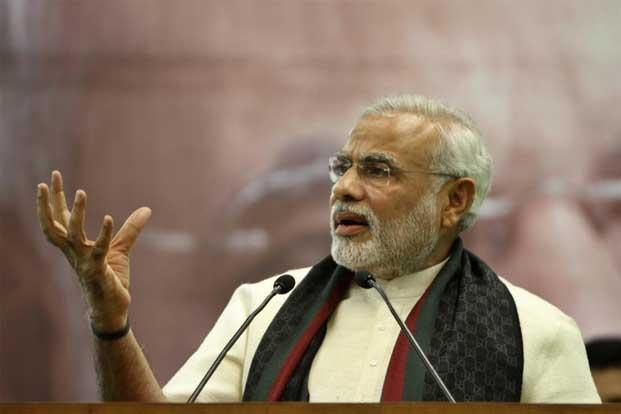
New Delhi, Mar 3: Against the backdrop of a growing chorus for making him the BJP's prime ministerial candidate, Gujarat chief minister Narendra Modi today lashed out at the "commission-seeking" Congress-led UPA government which is destroying the nation like a termite and dubbed Prime Minister Manmohan Singh as a "night watchman" for the Gandhi family.
Modi was scheduled to speak on good governance in Gujarat, but he used the forum at the BJP conclave here to lambast the UPA government and the Congress in his one-hour speech.
"Congress is destroying this country like termites. It is very difficult to deal with termites - you finish them in one place and they rise in another. The only medicine for this ailment is sweat of the BJP worker. Only this sweat can free this nation from the termite that is the Congress," Modi said in his speech, amid applause from the gathering.
In what sounded virtually like an election speech, Modi said the time has come to throw out the Congress and bring in a government that is sensitive towards the sufferings of the people.
Attacking the Congress for scams like the VVIP helicopter deal and 2G spectrum, Modi said, "The time has come to draw a comparison between the Congress and the BJP. While BJP is for a mission, Congress is for commission. The contest will be between mission and commission."
Modi also alleged that the Congress tradition has been to sacrifice the nation's interest for the sake of one family.
Without naming Prime Minister Manmohan Singh, he said the Congress appointed a "night watchman" to keep the seat warm for the first family of the Congress.
"They did not realize that the night will be so long and dark. As a buffer, they appointed an economist to the post," he said.
Modi's address stood out in sharp contrast to that of his Madhya Pradesh and Chhattisgarh counterparts Shivraj Singh Chouhan and Raman Singh. While the two chief ministers stuck to highlighting achievements of their governments, Modi dwelled on national issues.
The Talkatora Indoor Stadium was jam-packed when Modi delivered his speech.
Modi said that though Pranab Mukherjee was more deserving, the Congress did not make him the Prime Minister and chose Manmohan Singh. "They realized that if Pranab Mukherjee is successful then what will happen to the (Gandhi) family."
The Gujarat chief minister also criticized the National Advisory Council, headed by Congress president Sonia Gandhi, as one which is filled with people belonging to the "five- star" culture and having "total disconnect" with the people.
Modi, who may be given a prominent role in national politics by the BJP later this month by inducting him into the parliamentary board of the party, said it is a very big challenge and a matter of concern that the UPA government is there at the Centre.
"There is no feeling of whether there is a government or not. It is not in the Congress character or in their blood to do something for the nation," he alleged.
Earlier, Modi began his speech by thanking BJP president Rajnath Singh for felicitating him yesterday and attributed his third consecutive victory in Gujarat Assembly elections to the guidance of the national party leadership, party workers and the people of his state.
"This is a victory of the BJP's ideology and of its political culture," he said.
Modi praised the performance of the BJP governments in Madhya Pradesh, Chhattisgarh and Goa.
"My experience in Gujarat has been that the country has decided to move ahead. People of the country have decided to throw out the Congress. Our only concern is to fill the places vacated by the Congress with the right people," Modi said.
He also asked the party workers to rise above leadership issues and work tirelessly to bring the BJP to power.
"We should go from here with the pledge that we will contribute all our might for the party. BJP and lotus, the symbol of the BJP, have the strength to save this nation. Who is the individual, who is the leader does not matter. The aim is important. We have no right to disappoint the people," Modi said.






Comments
Add new comment